Meet Ben Simmons, Aussie basketball star and the toast of America
Almost overnight, Ben Simmons has gone from Melbourne schoolboy to $40m NBA sensation. It was easier than he thought.
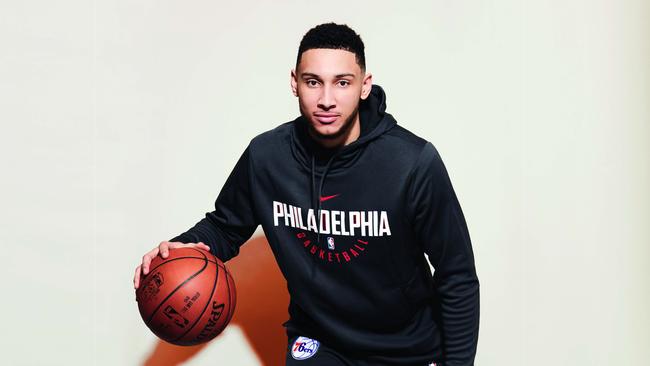
Ben Simmons juggles a basketball idly as he looks down from the eighth-floor window to the streets of Philadelphia below. Eventually he turns and says, “I’m going to jail after this,” smiling at the puzzled reaction of those in the room. “To visit a friend who has been good to me ever since I arrived here,’’ he quickly adds.
That friend — a fan of Simmons and his team, the Philadelphia 76ers — is the rapper and local celebrity Meek Mill, who was coming to the end of a jail term for breaching his probation for gun and drug offences. After visiting Mill, Simmons planned to fold his 208cm frame into his new Ferrari (leaving his Bentley and Range Rover in the garage) and take a long drive around Philadelphia, a town he can no longer walk alone in without being recognised and mobbed.
At 21 years of age, the former Melbourne schoolboy is not behind bars like his friend but his prodigious talent has forced him to live in his own gilded cage. It is the only way he can shield himself from the adulation of a basketball-mad America that believes the Australian will one day be named in the same breath as NBA legends Michael Jordan, LeBron James and Magic Johnson. Under this glare, the likes of which few Australian sports stars have ever endured, Simmons is trying to narrow his world to a small group of trusted old friends, family and teammates. They form a Praetorian Guard around him. “Everybody knows me out there [on the streets of Philadelphia],” he says. “I’m used to it now so I stay in my room a lot of the time and play video games. Last night I was playing Call of Duty with [fellow Australian NBA star] Dante Exum, who I used to play games with when I was 10 years old. I usually see my parents every day. My mum came around and cooked me breakfast this morning. My father picked me up from the airport last night. I don’t let other people too far into my circle, everybody around me knows that.”
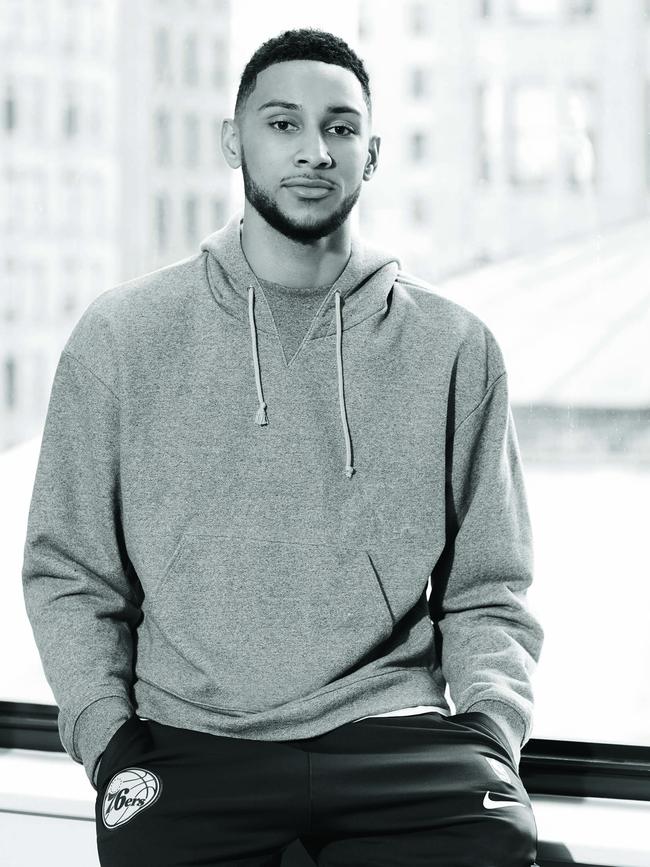
Some might call it Simmons Inc, but whatever he is doing to cope with his sudden rise to fame and the crushing expectations from both the US and Australia, it is working. “I don’t think it fazes him at all,” says 76ers head coach Brett Brown. “It is the thing that really has been as impressive as anything. He navigates this whole scene with tremendous grace and a higher level of maturity than I would have assumed. He is far along in establishing himself as something incredibly unique to the NBA. He is very, very different. I think the package is off the charts.”
The non-basketball world wondering what all the fuss is about need only look to the 76ers’ home stadium, the Wells Fargo Center, where management has placed a large board in the middle of the media room. The board is devoted entirely to Simmons and his achievements in his rookie year. On game day, amid the odour of deep-fried fast food, a scruffy-looking American basketball writer is scribbling notes from it ... “#1 in triple doubles among rookies ... #1 in rebounds per game among rookies ... #1 in assists per game among rookies ... #1 in steals per game among rookies.”
The board reads: “Ben Simmons joins Oscar Robertson and Magic Johnson as the only NBA rookies ever to post at least 1000 points, 500 rebounds and 500 assists in their debut seasons.”
So what does Simmons himself think about his debut season, in which he has helped to propel the 76ers from also-rans to the playoffs for the first time since 2012? “I was a little nervous in my first game, I wasn’t sure what to expect, but once I got my first basket I was fine,” he says. “I expected it to be a lot harder.” Really? What did you expect to be harder? “Everything,” he replies.
A week later, this same self-confidence made headlines when he was asked after a game who should win the NBA’s prestigious Rookie of the Year award, which will be announced on June 25. “Who would I pick? Me, 100 per cent,” Simmons said. “I think I have been playing solid all year. If you look at the numbers, you will see. People who know the game know.” It is tempting to view such self-confidence as arrogance. Yet Simmons is not lying — he’s the clear favourite to win the award — and while he may not conduct himself with the modesty of a sports star like Pat Rafter, he is a far cry from the brat-like behaviour of a Nick Kyrgios or a Bernard Tomic. On the court, he is fiercely competitive but doesn’t taunt or take cheap shots at his opponents. He doesn’t do tantrums. In person he is polite, thoughtful and likeable.
We meet in a room in the Ritz-Carlton Hotel, the same complex where he has his apartment. He walks into the room with a basketball, wearing long red check pants and a broad grin. In real life he looks taller and thinner, and when he juggles the ball his arms seem to extend across the room. He sits down on the couch for our interview in a tangle of arms and legs, like a giant folded-up huntsman. He is opinionated (Donald Trump “is somebody who is more concerned about himself than anybody else”) but mostly exudes a laidback attitude. He dislikes media interviews yet gets energised when he is asked something new, such as why he owns a pet piranha — “Why not? I’ve always wanted to do certain things and now I’m able to do them.” He’s one of Australia’s highest paid sports stars: his three-year contact with the 76ers is worth more than $US20 million and he has a reputed $20 million five-year contract with Nike. At this rate, rich list watchers believe, he will become Australia’s richest ever athlete.
What Simmons has always wanted to do since he was a toddler in Australia was play basketball. “It was one of those things where I had the dummy in my mouth and I was shooting it into the sink,” he says. “My dad told me to.”
But Dave Simmons denies that he was the basketball equivalent of a “tennis dad”, grooming his son for greatness at an early age. He says he never pushed Ben into basketball in any major way until the boy decided to become serious about it in his mid-teens. “I don’t think it was a case of wanting him to play,” he says. “He was the youngest of six so everyone played everything. They played basketball but we lived in NSW so he also played rugby and when we were in Melbourne he played AFL and tennis. He just loved sport ever since he was a little kid crawling on the beach in Newcastle.” But young Ben was always destined to gravitate towards basketball.
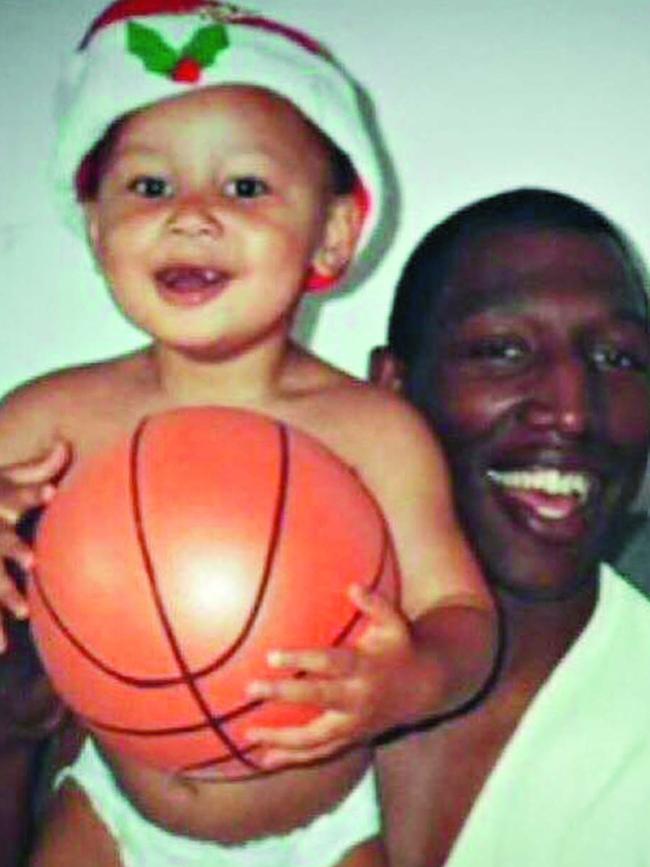
A 206cm African-American from the Bronx in New York, Dave Simmons moved to Australia in 1989 to play with the Melbourne Tigers. He played alongside Andrew Gaze in a team coached by Gaze’s father Lindsay and quickly won a reputation, being named in the All-Star team the following year. In a remarkable coincidence, the significance of which would only become apparent almost 30 years later, Gaze’s assistant coach was a young American called Brett Brown — now the 76ers’ head coach. “My first year with Lindsay Gaze was David Simmons’ first year as an American imported player playing for the Tigers,” Brown recalls. “David’s now wife and Ben’s mother Julie was a member of the cheer squad and an aerobics instructor so those two I have known prior to them getting married.”
Julie, an Australian, had four children from a previous marriage; after marrying Dave in 1994 they had a daughter, Olivia — and then on July 20, 1996, while they were living in Fitzroy, came Ben.
Dave’s basketball career took the extended family to Canberra, Rockhampton and Newcastle for the first seven years of Ben’s life. Dave recalls the time his son joined a basketball team aged four, when they were in Canberra. It didn’t go well. “He trained but when the game came he would never step out onto the court. He was afraid. I tried to bribe him by saying, ‘OK, we’ll buy you a toy’ to get him to play in the game. He always practised but he would never play.”
By the time the family moved to Newcastle, Ben was seven and had gained the confidence to step out on court. He trained with an under-12 team and to Dave’s surprise, the coach called him and asked if Ben could play with them despite the age difference. “I told the coach, ‘Are you sure, they are really big boys’ but he said, ‘No I think he’s good enough’ and I said ‘OK’. I remember that even as a seven-year-old playing against 10- and 11-year-olds he always looked as if he belonged.”
In Newcastle, Simmons’ days were filled with basketball, rugby and surfing. They are ingrained in his psyche. It was during those years that he got his first pets, golden retriever Jasper (who is still alive in Australia) and a cat called Tom. He would come home from school and if he was not playing sport or playing with his pets, he’d watch TV wide-eyed as Steve Irwin wrapped snakes around his neck and toyed with crocodiles. It is this memory that, even today, most anchors Simmons to Australia. “I was more of a country kid growing up,” he says. “Most people don’t know that about me. I am an animal lover and just being from Australia you are more invested in wildlife.”
When he was 10, the family moved back to Melbourne, where he played junior basketball and Australian rules football for the Beverley Hills Junior Football Club in Doncaster East. He excelled at both, winning several AFL best and fairest awards while also being named most valuable player for his Year Seven basketball team at Whitefriars College. For a while it looked as if he might choose footy over basketball.
Dave Simmons says the decisive moment came when Ben was 14 and was told he was going to be selected for an all-star regional football team. “His coach Joe came in and he is like, ‘Mate you’ve got to play, what a great honour.’ And Ben was like, ‘Yeah, but my heart’s not really in it.’ And Joe said, ‘If you’re heart’s not in it you need to give your spot to someone else.’ I think that was when he decided he wanted to focus on basketball.”
By 2009, Brett Brown was coach of the Australian men’s basketball team, the Boomers. That year he recalls walking into the basketball centre at the Melbourne Sports and Aquatic Centre and spotting a teenager shooting baskets by himself. It was Ben Simmons. “Somebody told me that that was Julie and David’s son so I walked over and introduced myself.” It would be eight years before they would meet again in a very different arena.
At 15 years of age, Simmons — by then already 203cm tall — moved to Box Hill Senior Secondary College where, as luck would have it, the basketball coach was Kevin Goorjian, brother of longtime Boomers coach Brian Goorjian. Goorjian was so impressed with Simmons’ potential that he marched into the principal’s office and asked to create a Year Nine team just so Simmons could play in it. “[The principal] said if I could get 12 boys and 12 girls together I could start a program, so I went out and got them,” Goorjian recalls. He was just the sort of mentor Simmons needed at that time, and they developed a rapport that Simmons has never forgotten. When the NBA held its draft ceremony in New York in 2016, Simmons invited only two people: his father Dave and his old coach, Kevin Goorjian.
The breakthrough moment for Simmons occurred just short of his 16th birthday, in June 2012, when he attended the Pangos All-American Camp, a gathering of the top young players in the US. “They are the top 100 kids in America and he was one of the youngest in the camp,” recalls his father. A report by America’s CBS captured the mood among US media: “The player who stole the show was a relative unknown … Ben Simmons, a 6’8” Australian native, was the talk of the camp.”
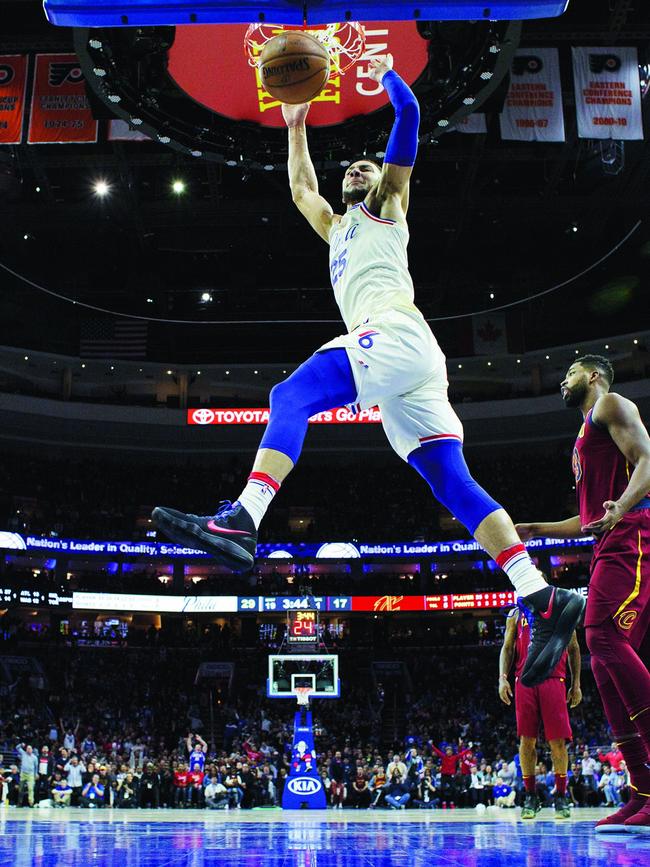
The rave reviews in the US caught both father and son by surprise. “I was like, ‘Oh, OK’ and I think Ben also started to pay attention to this stuff then,” says Dave. Ben recalls: “I would have been the youngest kid there and I stood out from everybody there and that is when everybody started talking about me, putting me in videos and things like that.”
He decided he needed to move to the US to compete. Dave was in favour but Julie didn’t want to lose her youngest at the age of 16. “I said to Mum, ‘You can’t hold me back, this is what I need to do, I want to get to the next level’,” he recalls.
Even so, when he moved in January 2013 to the Montverde Academy, a private high school in Florida with a top basketball program, he recalls Julie “was just crying at the airport”. Simmons says he didn’t get homesick because he was living in dorms with others who were in the same situation. The first difference he noticed about the US players was their athleticism. But when it came to having an instinct for the game, it was clear that he was gifted.
The following year, when he was 17, Simmons attended a session at the LeBron James Skills Academy in Las Vegas where he met the player he had most admired growing up. James took the young Australian under his broad wing and told him something he will never forget. “You have an opportunity to be better than me,” the NBA superstar told him. “But you can’t skip steps. You have to do the work. You’ve got to work on what you want, you have to have your goals all set and know where you want to be.” The two have since become good friends, swapping texts and catching up when they are in the same town.
By the time Simmons signed in late 2014 to play college basketball with Louisiana State University, he was already being described as the best young player in the US. He chose LSU partly because his godfather, David Patrick, was assistant coach but his year there was not always happy. One & Done, a doco made by a company with ties to his family, tells the story of Simmons’ time at LSU, documenting his frustration with the system that requires a player to be at least 19 and to have spent a year removed from high school before being eligible for the NBA draft.
Simmons described his year at LSU as a waste of time. He caused a stir in the US by describing the NCAA, the governing body of college sports, as “really f..ked up” and declaring that “everyone’s making money except the players”. Knowing he would spend only a year at college before joining the NBA, he paid little attention to his studies. “I was not interested in it,” he says, recalling his boredom while sitting in oceanography classes and dreaming of basketball.
His obvious disinterest during his year at university made some commentators question whether he was worthy of being the No.1 draft pick in the NBA. “There is just something about the way Simmons has handled himself, or been handled by his camp, that gives me a little bit of cause for pause, just in terms of whether mentally or personally he’s ready to make this jump to the NBA level,” former NBA coach Stu Jackson said at the time.
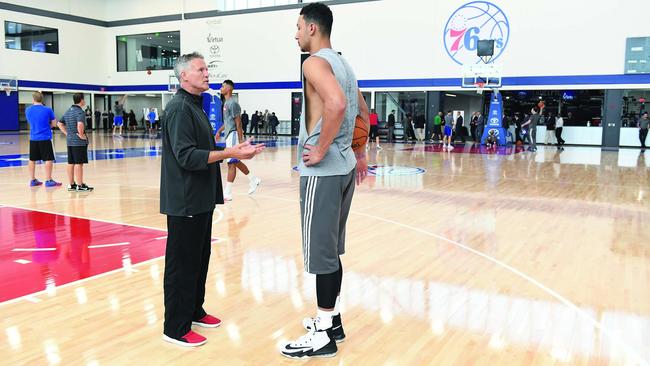
But in Philadelphia, the head coach of the 76ers — the team that had the first NBA draft pick — had no doubts about Simmons’ character. That’s because the coach was family friend Brett Brown. “He has been raised by good people, with strong values in a true family atmosphere,” says Brown, who is quick to add that Simmons’ talent was so obvious, he would have been the No.1 draft pick even without the family connection.
Brown shakes his head at the extraordinary set of coincidences that led to him choosing the son of his old friends from Melbourne as the top draft pick of the NBA. “I mean, you can’t make this stuff up,” he says. “To be head coach of the 76ers, to have the opportunity to draft first, to have an Australian who is probably going to be chosen first and by the way that Australian is the son of someone who I coached for five years, the other a woman I have known for 30 years … the dots are so incredibly aligned. Isn’t that life, where opportunity meets circumstance?”
“It’s kind of weird,” Simmons says of the family connection. “But at the same time it is perfect for me because I have someone I know and he knows me. He has been great, he has let me play my game, let me experiment and learn. I trust him in what he says and he trusts me.”
But in late September 2016, Simmons’ first NBA season of 2016-17 endedbefore it began. “It was the final day of a training camp and I jumped up on the rebound and landed on somebody’s foot, twisted it and hear a crack. I thought, ‘Damn it, I’ve snapped a bone in my foot … am I ever going to play NBA?’”
Philadelphia had lost its prize recruit for the year, the player the city was relying on to lift it out of the doldrums. Brown knew he needed to stop Simmons from going crazy during his year out of the game. So he turned his office into a basketball clinic. “He and I would sit, kind of like a classroom in my office,” says Brown. “We would go through tapes, watch Magic Johnson and watch him [Ben]. I was always like, ‘What do you see, what do you think, why do you think that?’ How do I help educate him if it can’t be done on court?”
At that time Brown decided to take a huge gamble. He wanted to turn Simmons into a point guard, the pivotal all-round player in the team who sets up the play and carries the ball. But point guards are usually medium-sized players, not 208cm giants. Not since the 206cm hall of fame star Magic Johnson had a point guard been so tall, but Simmons’ all-round athleticism gave Brown confidence. “The decision to turn Ben into a point guard was received with tremendous scrutiny in the city of Philadelphia,” Brown says. “[But] I felt like the greatest gift I could give him was the ball.”
During his year off, Simmons tried to distract himself by surrounding himself with animals. He bought two Savannah cats (a cross between wild African and domestic cats) and named them Nala and Scar from The Lion King, but one of them proved to be more wild than domestic. “This cat is crazy, it doesn’t want to eat, it’s hiding from us,” Simmons’ flatmate and half-brother Sean Tribe complained last year. “Every time we go near it it’s scratching. It’s like a wild animal.”
While Simmons was on a road trip, Tribe sent the two cats back to the breeders, getting bloodied hands from scratches while packing them into the travel crate. He called Ben on the West Coast to curse him, saying “f..k you … I don’t care if you’re asleep ... you and your f..king animals”. Now Simmons owns only a French bulldog called Flash and multiple fish, including his pet piranha.
When Simmons finally made his NBA debut last October, he scored 18 points and had 10 rebounds. By three games into the season he was already breaking records and was being compared with Magic Johnson in his rookie season.
On match days, he usually sleeps until the team bus is due to leave. “I don’t listen to music before games and I don’t like texting people before games,” he says. After the game, he often stays up with friends or teammates until about 4am. “I really don’t have pressure from other people,” he adds. He rarely looks at Twitter and doesn’t pay attention to TV commentators. His parents Dave and Julie moved to Philadelphia and live with his dog Flash only three blocks from the apartment he shares with Sean and his fish.
Simmons also has a girlfriend, a 25-year-old hip-hop singer known as Tinashe, who he met in a club in February. With 936,000 Twitter followers of her own, she and Simmons are a target for the paparazzi whenever they go out together. “She’s great,” is all he will say about his cross-country relationship with the LA-based singer.
Despite his rocketing fame in America, Simmons says he will always consider himself an Australian. He has 656,000 Twitter followers and follows only 110 others but they include Vegemite, Holden, comedy duo Hamish & Andy and the AFL club Essendon. He says he plans to help the Australian men’s basketball team, the Boomers, win their first ever Olympic medal at Tokyo 2020, and in August will return to Melbourne for the off-season where he will run two basketball camps as well as throw some hoops with the kids at Box Hill Senior Secondary College, the place where it all began.
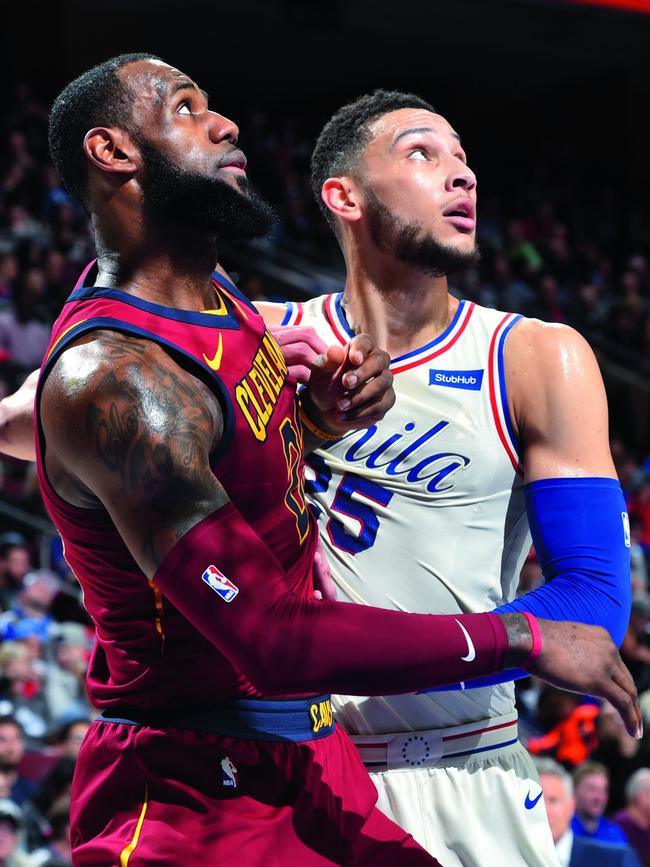
“From Melbourne, Australia … Ben Simmons!” the announcer says to a thunderous roar as Simmons runs out on court for the sold-out clash in Philadelphia between his 76ers and LeBron James’s Cleveland Cavaliers. For the first 20 minutes it is as if Simmons, wearing his father’s number 25, is playing an exhibition match. He weaves the ball between his legs, throws impossible passes through heavy traffic and dunks effortlessly. He is easily the best player on court. Near half-time the team is 30 points up. Then James wakes up. He wills Cleveland back into the game with sheer brute force. It is as if there are only two men on the court — James and Simmons, the master and the apprentice.
With one second to go, James misses a free throw and the 76ers win by a point. Simmons has scored 27 points with an astonishing 15 rebounds and 13 assists. “LeBron James, Ben Simmons stage epic duel in Philadelphia,” the NBA website declares. Later, The Washington Post writes of the impact Simmons has had in propelling his team “from cellar-dweller to playoff team”: “This isn’t how it is supposed to go. Teams aren’t supposed to skip steps like this.”
And Simmons is not supposed to have taken such giant strides in his rookie year at the highest level of world basketball. But he isn’t listening to us. He is listening to the words of his friend and mentor LeBron James: “You have to have your goals all set and know where you want to be.”
“The opportunity that I have right now hasn’t been given to any other Australian athlete,” says Simmons. “I want to be a leader for kids back home, somebody who has a big influence on Australian sport. But at the same time, I want to be real. People have to understand I don’t want to be a fake role model. I want them to understand I am a real person.”
Simmons pauses to reflect on what he has just said. “I just want to be the best athlete to ever come out of Australia,” he says. “Definitely.”


To join the conversation, please log in. Don't have an account? Register
Join the conversation, you are commenting as Logout